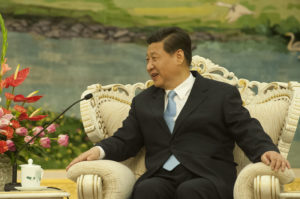
Secretary of Defense Leon E. Panetta meets with Chinese Vice President Xi Jinping prior to a meeting in Beijing China, Sept. 19, 2012. Panetta visited Tokyo, Japan before continuing to Beijing and traveling to Auckland, New Zealand on a week long trip to the Pacific. DoD photo by Erin A. Kirk-Cuomo
The mainstream China narrative relentlessly portrays the Middle Kingdom as becoming more aggressive in geopolitics, but on his blog, LewRockwell.com, Lewellyn Rockwell suggests the narrative is backward. He writes:
In the Shanghai Communique signed by Nixon, Taiwan was conceded to be a ‘part of China.’ Are we now going to fight a war to prevent Beijing from bringing the island home to the ‘embrace of the motherland’?
And if we are prepared to fight, Beijing should not be left in the dark. China ought to know the risks it would be taking.
Cuba is an island, across the Florida Strait, with historic ties to the United States. Taiwan is an island 7,000 miles away, on the other side of the Pacific.
This month, Cubans rose up against the 62-year-old Communist regime fastened upon them by Fidel and Raul Castro.
By what yardstick would we threaten war for the independence of Taiwan but continue to tolerate 60 years of totalitarian repression in Cuba, 90 miles away?” Read this.
In point of fact, China doesn’t threaten us. The US is threatening China. Tom Fowdy fills in the details: “But what has changed recently? The answer is that, unlike in past decades, the US has pursued an increasing military encirclement of China’s periphery and has forced Beijing to respond in tandem; Xi Jinping’s moves have not emerged out of thin air. Unless China’s rise was completely on terms the US has sought to impose, opposition to it from Washington was always inevitable no matter what it did. It is one thing to claim ‘China wants to seize the East China sea!’, but another to overlook the fact that Japan deliberately sought to provoke China in the early 2010s by incorporating the Diaoyu/Senkaku Islands as a prefecture, which then-US President Obama announced was covered by the US-Japan defense treaty.
These kinds of provocations are part of a broader effort of China containment, which spawn tensions and inevitable responses from Beijing, which is then accused of being aggressive and expansionist. This all creates a vicious circle of militarization from both sides as China strives to defend its ‘national sovereignty’ against perceived foreign intrusion. Consequently, the narrative of a ‘more assertive and coercive’ China takes Beijing’s actions out of context, and fails to see that a regional competition with the United States becomes a need to attain security, as opposed to a global ‘good vs evil’ battle for hegemony and a lust for power. Brands and Beckley talk about the aspect of encirclement in China’s strategic point of view, yet fail to understand and appreciate what it actually means.
In conclusion, if you don’t want a war with China, stop trying to encircle it militarily. These types of articles that argue that Beijing has a ‘closing strategic window” to get what it wants and that it ‘must resort to war’ are extremely dangerous because they can become a self-fulfilling prophecy. If you think that your enemy has no other choice but to pursue war against you, what does that make you do? It makes you prepare for one in response and miscalculate that there is no other option.”
Knowing the truth is important, but even more important is to act on it. Let’s stop the gang of criminal lunatics that controls Washington while we still can.
Read more here.
If you’re willing to fight for Main Street America, click here to sign up for the Richardcyoung.com free weekly email.





